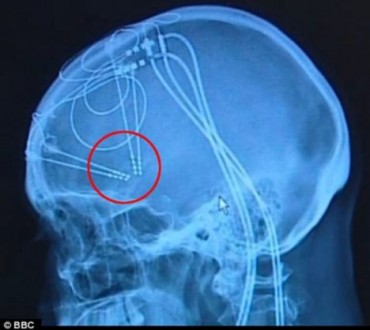Via Daily Mail

People suffering from depression and bipolar disorder who don’t respond to drugs and therapy could finally find relief from their symptoms thanks to a brain pacemaker.
The medical device is implanted under the skull and sends electrical impulses deep into the brain.
Scientists led by Dr Helen Mayberg from the Emory University School of Medicine in Atlanta, Georgia, found 41 per cent responded to the treatment and one in five went into remission after just six months.
The trial included patients with bipolar disorder along with those with severe depression. It followed on from an earlier study by Dr Mayberg that was the first to show deep brain stimulation could help people with major depressive disorder.
In the latest trial, study participants received single-blind stimulation for four weeks (patients did not know if the DBS system was on or off), followed by active stimulation for 24 weeks.
Patients were evaluated for up to two years following onset of active stimulation. Seventeen patients were enrolled in the study.
The scientists found 41 per cent responded to the treatment while 18 per cent achieved remission in the first 24 weeks. However, these rates vastly improved as stimulation continued.
After two years of active stimulation 92 per cent had responded in some way to the treatment, while 58 per cent had achieved remission.
Patients who achieved remission did not experience a spontaneous relapse. Rates were similar between depressed and bi-polar patients – none of whom experienced a manic episode during treatment.
Dr Mayberg and her colleagues continue to refine this intervention. Why and how this treatment works is the primary focus of ongoing research.
The pacemaker sends a high-frequency electrical stimulation to a predefined area of the brain specific to the particular neuropsychiatric disorder. It was found that a regular “feed” from the brain pacemaker alleviates the depression in the patient.
Although the procedure is invasive and most patients would feel a bit hesitant with the procedure, the study showed that when the brain is given constant stimulation, a significant decrease in the patient’s episode of depression and an increase in function.
Study co-author Paul Holtzheimer from Dartmouth Medical School said: ‘Most of these patients have been in a depressed state for many years and are disabled and isolated.
‘As their depression improves, they need a process to help them achieve full recovery that includes integration back into society.
‘We hope to optimise the rate of improvement for these patients by using a model of care that provides psychotherapeutic rehabilitation built on evidence-based psychotherapy but tailored to the specific individual’s situation.’
The study was published Online First by Archives of General Psychiatry.
Deep brain stimulation has already been shown to help patients with chronic pain and Parkinson’s disease.



